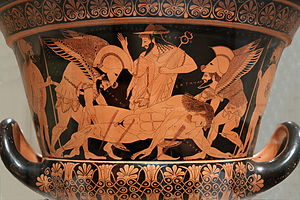In his Constitution of Athens Aristotle named Nicias as one of the three best citizens of Athens (28.5). His character loomed large over key events during the Peloponnesian War with a peace treaty named after him and two bluffs made in debates which backfired and had very different outcomes. Of the first, it resulted in the Athenian victory at Sphacteria, a huge victory where Nicias has tried to call out the demagogue Cleon and invited him to make an attack there. Cleon did and was successful which must have been to the chagrin of Nicias.

Nicias and a bluff called.
The second bluff was to have consequences which would be disastrous for both himself and Athens. In 416 BC a plea came from Egesta, a settlement on Sicily. Athens was invited to support this community against Selinus and Syracuse. Initially it accepted, this was nothing unusual as back in 427 BC it had taken similar actions on Sicily. The island was dominated by Syracuse, a colony of Corinth and therefore set against Athens in the course of the ongoing Peloponnesian War. Athens making advances and disrupting the supplies sent from it was a feasible idea and one which was facilitated by their very capable navy.
In 416 BC things were different. Nicias had helped negotiate a peace between Athens and Sparta (the so called ‘Peace of Nicias’). This kept Sparta and Athens from making war directly upon each other though a proxy war fought by the allies of either was still in play. Athens now had the resources to extend actions to Sicily and this was an opportunity embraced for a number of reasons. Firstly, Athens needed to look strong to its allies, it would also provide some much needed payback to Syracuse and may even bring in some allies on the island.
After the first debate a small force of 60 ships was decided upon along with three generals; Alcibiades, Lamachus and Nicias. The idea of such a venture was wholeheartedly supported by Alcibiades. But not by Nicias. For whatever reason he pushed back against the idea, however, he couldn’t dissuade the Assembly and so chose the tactic of a bluff. In the second debate he famously stated that his opposition was due to how inferior the numbers were. A much larger force was needed. The men in the Assembly, far from being persuaded against this expedition, now felt that Nicias was its champion and were enthralled by his increase in its numbers.
The decision was to go ahead with a much larger force, some 134 triremes (not counting support ships) left the Piraeus to cheering crowds. This was the infamous Sicilian Expedition and it would doom many of its contingent including Nicias.
A fateful August evening.
By 413 BC things had gone from bad to worse for the Athenians. They were camped in marshland south of Syracuse in a less than ideal spot. Illness and disease was rife given the marshy conditions. Nicias was seriously ill with kidney problems. The expedition had fallen into despair, now the beseigers of Syracuse were themselved besieged. However, they had one option, to make a break for it with their navy. The Athenian navy was still in good order, they could therefore sail out of the Great Harbour at Syracuse and regroup perhaps at Catana or some allied location nearby. But then on the night of the 27th August 413 BC, around 9.40 pm a lunar eclipse took place which was to change everything.
The lunar eclipse only took some 50 minutes but its effects were to last much longer. The soothsayers in the Athenian camp interpreted this as the gods requesting the Athenians stay for 27 days (Thuc.7.50). Nicias was famous for his piety and so took the advice, the Athenians weren’t going anywhere.
In Syracuse the Spartan general Gylippus has the Syracusan navy repeatedly drilled to level the playing field. In the Athenian camp men died, morale got worse and the ships deteriorated further. After this point Syracuse gained the upper hand in the naval contests. Athens desperately tried to break out but failed.
The outcome was a doomed march in which the Athenian force was harried at every turn and eventually surrendered. It was a humbling defeat which caused questions amongst the allies of Athens. Worse still in the duration of the campaign Athens had come to rely on its allies more and a result of this was the agreement to raid Spartan territory. The Peace of Nicias came to an end, as did Nicias who was executed at Syracuse.
Eclipses weren’t always so savage, but they could have an impact. If you want to read about some more, including an attempt to date Homer and how one helped with the chronology of Assyria read here.


